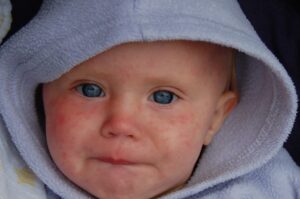 Thought to have been all but eradicated in 2000, measles has reared its head again, in some places in almost epidemic proportions. Active outbreaks have been reported in the past year in at least 23 states, one of them being Washington. (The first confirmed case was in 2018 Clark County in the southwest part of the state, including Vancouver. Since then it has spread.) Measles is highly contagious; in fact, the CDC states that approximately 90% of unvaccinated individuals who are near to a person with the disease will contract it themselves. (However, if you contracted measles as a child, you have developed a natural immunity.)
Thought to have been all but eradicated in 2000, measles has reared its head again, in some places in almost epidemic proportions. Active outbreaks have been reported in the past year in at least 23 states, one of them being Washington. (The first confirmed case was in 2018 Clark County in the southwest part of the state, including Vancouver. Since then it has spread.) Measles is highly contagious; in fact, the CDC states that approximately 90% of unvaccinated individuals who are near to a person with the disease will contract it themselves. (However, if you contracted measles as a child, you have developed a natural immunity.)
A small number of individuals who were previously vaccinated have also developed the measles. Part of the reason is that the measles vaccine used to be a one-dose procedure; but it is now given on a two-dose basis to increase protection. But it’s still not 100% effective. About 3% of those who received the MMR vaccine do not develop an immunity to measles. So there is a very slight possibility that even if you and your family have had the two-dose measles vaccine, you might develop it anyway if you encounter someone with an active case.
Why is measles such a health threat? The virus responsible can live on hard surfaces and in the air for up to two hours after an individual has been in the space. Should that person cough, the virus is dispersed into the air in very small droplets. Simply breathing within the area or touching a hard surface like a door knob where the person coughed means you may come into contact with it without even being aware. And what’s even worse, a person who has developed the measles may be contagious for up to four days BEFORE the rash even appears. So someone might have an active case without being aware of it. Fever is usually the first symptom, but because so many things can cause a fever, you might not even suspect measles as the culprit.
So what can you do if measles has been brought into your home, either because someone living there has come down with it, or someone has brought the microorganism in? Here are some things you can do to disinfect your home.
Disinfecting Your Home After the Measles
If measles has affected your home, it’s important to take steps to decontaminate it and continue to disinfect so long as someone in your home has the measles. The virus is contagious for four days after the rash appears, so keep up your cleaning regimen even after the rash fades, if it is within that time period.
The most important thing you and those who live in your home can do to prevent the spread of measles is to frequently wash your hands. Adding hand sanitizer can help even more. Wear a particle mask and avoid touching your face. Also:
- Immediately dispose of used tissues, since the virus can remain on them for up to 2 hours. Place them in a covered trash can to cut down on the possibility of microbe transmission.
- Use cleaners approved by the EPA as disinfectants to clean hard surfaces. Follow the label instructions carefully, because some cleaners may need to stay wet on the surface for a minute or longer, some up to 10-15 minutes. Pay special attention to things like door knobs and sink faucet handles. Also, all flat surfaces that are horizontal (such as tables and counters) should be cleaned with a disinfectant in case airborne particles have landed on them. Toys also need to be disinfected.
- Use spray mists to disinfect the air. Not all air fresheners are disinfectants, so look for one that has confirmed disinfecting capability, such as Lysol spray. Many hospitals in Europe are now using mists made of a combination of essential oils that are believed to carry germs (these include rosemary, cajeput and pine needle oils).
The measles virus is highly susceptible to kill-off from ultraviolet light, so letting sunshine into your home can help. So can high heat, so laundering clothing and soft items like stuffed animals and then running them through the dryer should kill any viruses on their surfaces.
Some public facilities that have experienced active measles contamination may opt to have a professional biohazard cleaning company like ours come in and handle the disinfection, but most likely you won’t need to resort to that for your own home. Hopefully following our tips above should do the job.



